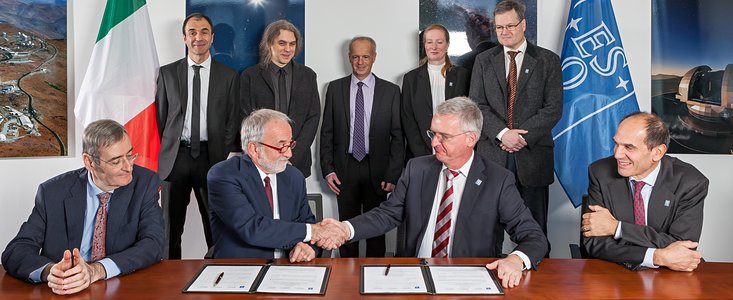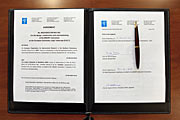Mitteilung
Vereinbarung für MAORY, das System Adaptiver Optik des E-ELT, unterzeichnet
10. Dezember 2015
Zwischen der ESO und einem internationalen Konsortium [1] wurde eine Vereinbarung für das Design und die Konstruktion des Systems zur adaptiven Optik unterzeichnet, das am European Extremely Large Telescope (E-ELT) installiert werden soll.
Unterzeichnet haben Nicolò D'Amico, der Präsident des Istituto Nazionale di Astrofisica (INAF, Italien), für das Konsortium und Tim de Zeeuw, der ESO-Generaldirektor, bei einer Zeremonie am ESO-Hauptsitz in Garching am 10. Dezember 2015. Auch der Projektleiter von MAORY, Emiliano Diolaiti (INAF), war anwesend.
Renato Cianfarani, der italienische Generalkonsul, und Roberto Tamai, der ESO-Programmmanager des E-ELT, nahmen teil. Weitere Teilnehmer waren Paolo Ciliegi (INAF MAORY-Projektmanager), Philippe Feautrier (IPAG MAORY-Ko-Investigator), Filippo Maria Zerbi (Leiter der National Division for Ground Based Programmes der wissenschaftlichen Abteilung des INAF), sowie Giovanni Fabrizio Bignami, italienisches Mitglied des ESO-Rates.
MAORY, kurz für Multi-conjugate Adaptive Optics RelaY, wird die Operation von Instrumenten im nahen Infrarotbereich am E-ELT ermöglichen. Dazu zählt auch MICADO, die E-ELT-Kamera in erster Generation, die von der Verwendung eines Laserleitsterns und der adaptiven Optik profitieren wird.
MAORY wird das Licht von sechs Laserleitsternen und drei natürlichen Leitsternen genau analysieren und die exakte Justage der deformierbaren Spiegel zwischen dem Himmelsobjekt und dem wissenschaftlichen Instrument berechnen.
Durch schnelle, aber winzige Veränderungen der Spiegelausrichtung werden störende Effekte der Atmosphäre auf astronomische Objekte elliminiert. Dadurch können deutlich schärfere Bilder vom Detektor erhalten werden. Auf diese Weise können wir auch sehr viel kleinere Details detektieren. Die adaptive Optik ermöglicht es so Astronomen auch deutlich lichtschwächere Objekte zu beobachten, beispielsweise weiter entfernte Galaxien, da das auf die Kamera einfallende Licht konzentrierterer auftrifft. Erst mit MAORY wird die hochauflösende Kamera MICADO ihre ambitionierten Ziele erreichen können.
MAORY wird drei deformierbare Spiegel verwenden, wovon eines der massive quartäre 2,4-Meter-Spiegel des Teleskops sein wird. Die anderen deformierbaren Spiegel werden innerhalb von MAORY angesiedelt sein. Durch die Verwendung mehr als eines deformierbaren Spiegels wird MAORY Turbulenzen mehrerer Schichten in verschiedenen Höhen der Atmosphäre kompensieren können. Im Vergleich zu einem einfacheren adaptiven Optik-System profitieren Astronomen von einem sehr viel größeren Sichtfeld.
MAORY baut auf die Erfahrungen des Multi-Conjugate Adaptive Optics Demonstrator (MAD) auf, mit dem sich die Technologie hinter MAORY am Very Large Telescope (VLT) der ESO bewährt hat. MAORY basiert außerdem auf langjähriger Entwicklungsarbeit sowohl seitens der ESO als auch der astronomischen Gemeinschaft und der aktuellen Arbeit der Adaptive Optics Facility des VLT. Es wird dem E-ELT dabei helfen, die Rolle des größten Auges in den Himmel voll auszufüllen.
Endnoten
[1] Das MAORY-Konsortium besteht aus dem Istituto Nazionale di Astrofisica (Italien) und dem Institut National des Sciences de l’Univers du Centre National de la Recherche Scientifique (Frankreich).
Links
Kontaktinformationen
Emiliano Diolaiti
MAORY Principal Investigator
INAF
Bologna, Italien
Tel: +39 051 2095708
E-Mail: emiliano.diolaiti@oabo.inaf.it
Philippe Feautrier
MAORY Co-Investigator
IPAG
Grenoble, France
Tel: +33 4 76 63 59 81
E-Mail: philippe.feautrier@obs.ujf-grenoble.fr
Suzanne Ramsay
ESO MAORY Project Scientist
Garching bei München
Tel: +49 89 3200 6665
E-Mail: sramsay@eso.org
Florian Kerber
ESO MAORY Project Manager
Garching bei München
+49 89 3200 6757
E-Mail: fkerber@eso.org
Richard Hook
ESO Public Information Officer
Garching bei München
Tel: +49 89 3200 6655
Mobil: +49 151 1537 3591
E-Mail: rhook@eso.org
Über die Mitteilung
| ID: | ann15093 |
Our use of Cookies
We use cookies that are essential for accessing our websites and using our services. We also use cookies to analyse, measure and improve our websites’ performance, to enable content sharing via social media and to display media content hosted on third-party platforms.
ESO Cookies Policy
The European Organisation for Astronomical Research in the Southern Hemisphere (ESO) is the pre-eminent intergovernmental science and technology organisation in astronomy. It carries out an ambitious programme focused on the design, construction and operation of powerful ground-based observing facilities for astronomy.
This Cookies Policy is intended to provide clarity by outlining the cookies used on the ESO public websites, their functions, the options you have for controlling them, and the ways you can contact us for additional details.
What are cookies?
Cookies are small pieces of data stored on your device by websites you visit. They serve various purposes, such as remembering login credentials and preferences and enhance your browsing experience.
Categories of cookies we use
Essential cookies (always active): These cookies are strictly necessary for the proper functioning of our website. Without these cookies, the website cannot operate correctly, and certain services, such as logging in or accessing secure areas, may not be available; because they are essential for the website’s operation, they cannot be disabled.
Functional Cookies: These cookies enhance your browsing experience by enabling additional features and personalization, such as remembering your preferences and settings. While not strictly necessary for the website to function, they improve usability and convenience; these cookies are only placed if you provide your consent.
Analytics cookies: These cookies collect information about how visitors interact with our website, such as which pages are visited most often and how users navigate the site. This data helps us improve website performance, optimize content, and enhance the user experience; these cookies are only placed if you provide your consent. We use the following analytics cookies.
Matomo Cookies:
This website uses Matomo (formerly Piwik), an open source software which enables the statistical analysis of website visits. Matomo uses cookies (text files) which are saved on your computer and which allow us to analyze how you use our website. The website user information generated by the cookies will only be saved on the servers of our IT Department. We use this information to analyze www.eso.org visits and to prepare reports on website activities. These data will not be disclosed to third parties.
On behalf of ESO, Matomo will use this information for the purpose of evaluating your use of the website, compiling reports on website activity and providing other services relating to website activity and internet usage.
Matomo cookies settings:
Additional Third-party cookies on ESO websites: some of our pages display content from external providers, e.g. YouTube.
Such third-party services are outside of ESO control and may, at any time, change their terms of service, use of cookies, etc.
YouTube: Some videos on the ESO website are embedded from ESO’s official YouTube channel. We have enabled YouTube’s privacy-enhanced mode, meaning that no cookies are set unless the user actively clicks on the video to play it. Additionally, in this mode, YouTube does not store any personally identifiable cookie data for embedded video playbacks. For more details, please refer to YouTube’s embedding videos information page.
Cookies can also be classified based on the following elements.
Regarding the domain, there are:
- First-party cookies, set by the website you are currently visiting. They are stored by the same domain that you are browsing and are used to enhance your experience on that site;
- Third-party cookies, set by a domain other than the one you are currently visiting.
As for their duration, cookies can be:
- Browser-session cookies, which are deleted when the user closes the browser;
- Stored cookies, which stay on the user's device for a predetermined period of time.
How to manage cookies
Cookie settings: You can modify your cookie choices for the ESO webpages at any time by clicking on the link Cookie settings at the bottom of any page.
In your browser: If you wish to delete cookies or instruct your browser to delete or block cookies by default, please visit the help pages of your browser:
Please be aware that if you delete or decline cookies, certain functionalities of our website may be not be available and your browsing experience may be affected.
You can set most browsers to prevent any cookies being placed on your device, but you may then have to manually adjust some preferences every time you visit a site/page. And some services and functionalities may not work properly at all (e.g. profile logging-in, shop check out).
Updates to the ESO Cookies Policy
The ESO Cookies Policy may be subject to future updates, which will be made available on this page.
Additional information
For any queries related to cookies, please contact: pdprATesoDOTorg.
As ESO public webpages are managed by our Department of Communication, your questions will be dealt with the support of the said Department.



